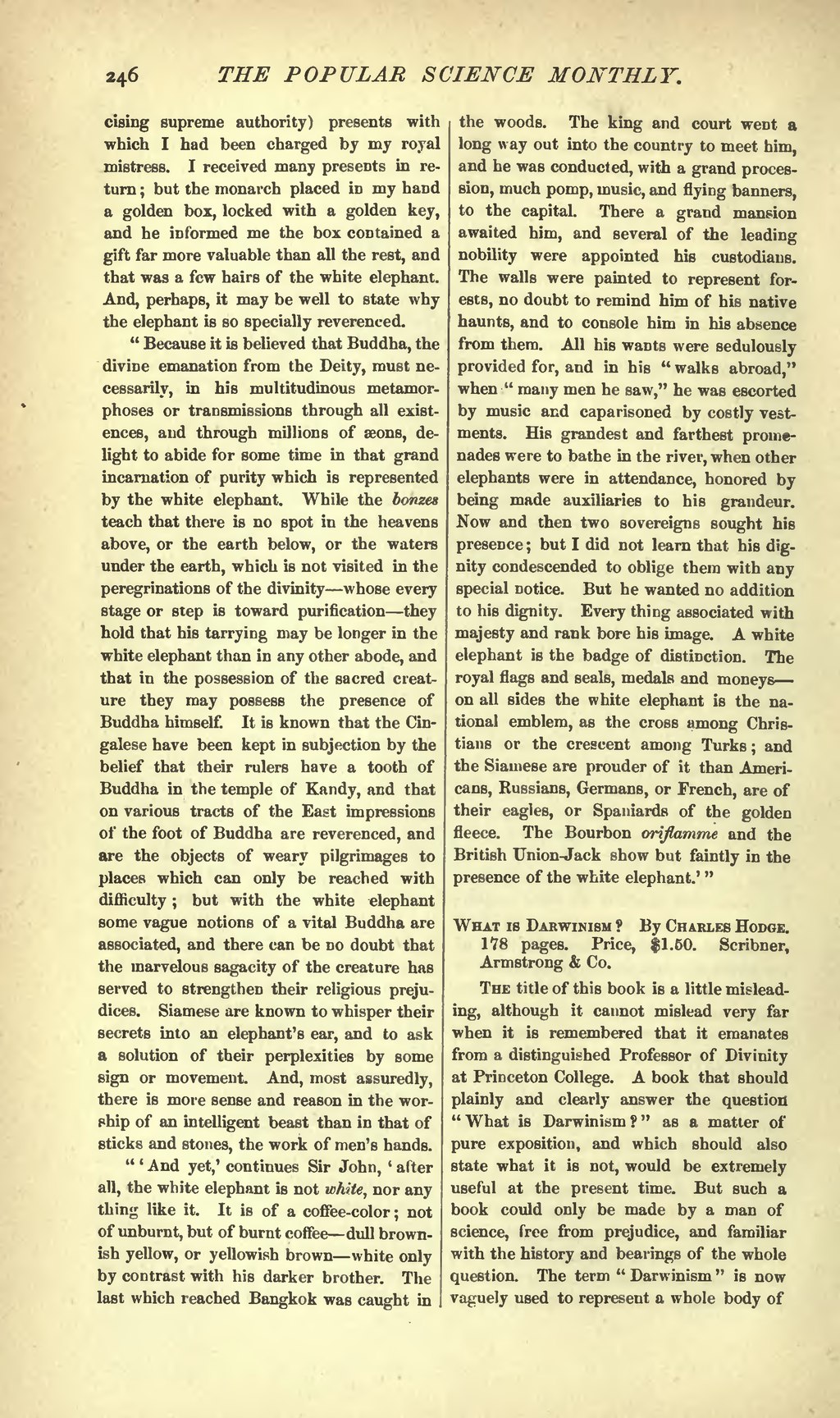cising supreme authority) presents with which I had been charged by my royal mistress. I received many presents in return; but the monarch placed in my hand a golden box, locked with a golden key, and he informed me the box contained a gift far more valuable than all the rest, and that was a few hairs of the white elephant. And, perhaps, it may be well to state why the elephant is so specially reverenced.
"Because it is believed that Buddha, the divine emanation from the Deity, must necessarily, in his multitudinous metamorphoses or transmissions through all existences, and through millions of æons, delight to abide for some time in that grand incarnation of purity which is represented by the white elephant. While the bonzes teach that there is no spot in the heavens above, or the earth below, or the waters under the earth, which is not visited in the peregrinations of the divinity—whose every stage or step is toward purification—they hold that his tarrying may be longer in the white elephant than in any other abode, and that in the possession of the sacred creature they may possess the presence of Buddha himself. It is known that the Cingalese have been kept in subjection by the belief that their rulers have a tooth of Buddha in the temple of Kandy, and that on various tracts of the East impressions of the foot of Buddha are reverenced, and are the objects of weary pilgrimages to places which can only be reached with difficulty; but with the white elephant some vague notions of a vital Buddha are associated, and there can be no doubt that the marvelous sagacity of the creature has served to strengthen their religious prejudices. Siamese are known to whisper their secrets into an elephant's ear, and to ask a solution of their perplexities by some sign or movement. And, most assuredly, there is more sense and reason in the worship of an intelligent beast than in that of sticks and stones, the work of men's hands.
"'And yet,' continues Sir John, 'after all, the white elephant is not white, nor any thing like it. It is of a coffee-color; not of unburnt, but of burnt coffee—dull brownish yellow, or yellowish brown—white only by contrast with his darker brother. The last which reached Bangkok was caught in the woods. The king and court went a long way out into the country to meet him, and he was conducted, with a grand procession, much pomp, music, and flying banners, to the capital. There a grand mansion awaited him, and several of the leading nobility were appointed his custodians. The walls were painted to represent forests, no doubt to remind him of his native haunts, and to console him in his absence from them. All his wants were sedulously provided for, and in his "walks abroad," when "many men he saw," he was escorted by music and caparisoned by costly vestments. His grandest and farthest promenades were to bathe in the river, when other elephants were in attendance, honored by being made auxiliaries to his grandeur. Now and then two sovereigns sought his presence; but I did not learn that his dignity condescended to oblige them with any special notice. But he wanted no addition to his dignity. Every thing associated with majesty and rank bore his image. A white elephant is the badge of distinction. The royal flags and seals, medals and moneys—on all sides the white elephant is the national emblem, as the cross among Christians or the crescent among Turks; and the Siamese are prouder of it than Americans, Russians, Germans, or French, are of their eagles, or Spaniards of the golden fleece. The Bourbon oriflamme and the British Union-Jack show but faintly in the presence of the white elephant.'"
What is Darwinism? By Charles Hodge. 178 pages. Price, $1.50. Scribner, Armstrong & Co.
The title of this book is a little misleading, although it cannot mislead very far when it is remembered that it emanates from a distinguished Professor of Divinity at Princeton College. A book that should plainly and clearly answer the question "What is Darwinism?" as a matter of pure exposition, and which should also state what it is not, would be extremely useful at the present time. But such a book could only be made by a man of science, free from prejudice, and familiar with the history and bearings of the whole question. The term "Darwinism" is now vaguely used to represent a whole body of
